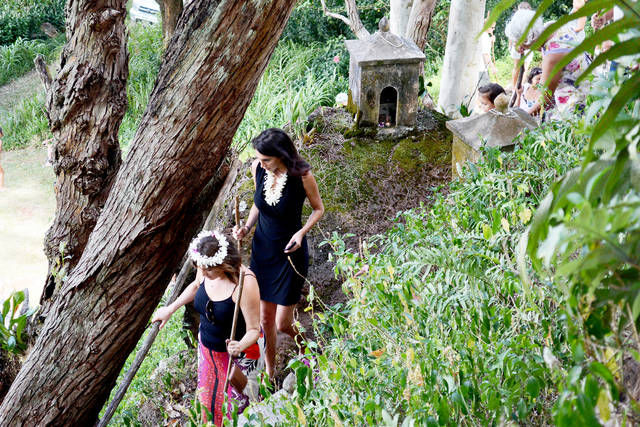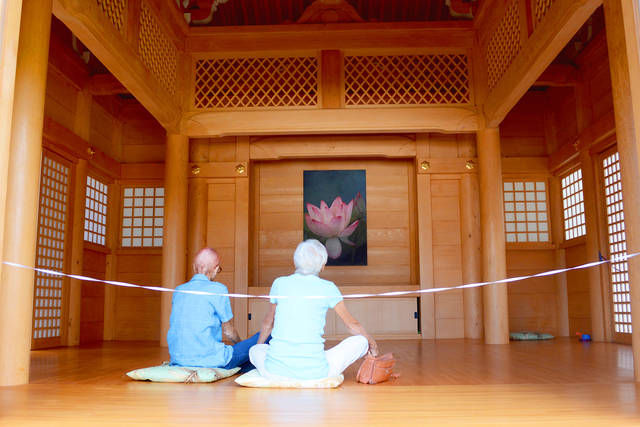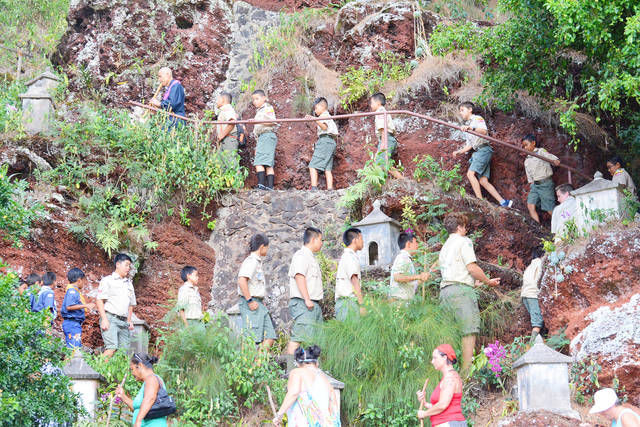LAWAI — The Lawai International Center does not have visitors. It never has. “We have only family members to come home,” said Lynn Muramoto, center president. “So thank you, everyone, for coming home.” About 500 people came to the grounds
LAWAI — The Lawai International Center does not have visitors. It never has.
“We have only family members to come home,” said Lynn Muramoto, center president. “So thank you, everyone, for coming home.”
About 500 people came to the grounds for the 17th annual Pilgrimage of Compassion on Sunday. It’s considered a time for hearts to unite and a place where all are welcome to learn and understand.
“It may be a Buddhist path, and at the same time, many of the center board members are Christians,” Muramoto said. “The first large contribution came from a Jewish community foundation.”
She said it is a rare land where aunties, uncles, grandparents, elected leaders, taro farmers and more come together as one.
“I don’t know if there are many places on the planet like this where we as humble beings can then make changes throughout the world,” Muramoto said. “We do this by taking the action of being here.”
The annual gathering attracted keiki to kupuna on a beautiful afternoon. Exhibits for lei making, coconut weaving, mochi pounding and calligraphy were popular. Others helped themselves to free food and drink, mingled, bought baked goods and checked out the silent auction.
The main program started with passionate performances by Taiko Kauai, followed by song and dance by children of Ni’ihau.
The Lawai Valley is considered sacred. Ancient Hawaiians traveled from afar to receive the spiritual benefits of the Lawai Valley. They were followed by the first immigrants from Japan who built 88 shrines on the hillside of the valley, which is a miniature replica of the 1,000-mile pilgrimage in Shikoku, Japan.
But over the years, the land was forgotten and became overgrown. Nearly 30 years ago, volunteers came in and cleared what had become a jungle, and “opened up the energies of the land,” Muramoto said.
The Lawai International Center has since been a gathering place for all “to hear what is not said, to see what cannot be seen, to feel what cannot be touched, to know peace and to receive the true spirit of aloha.”
Three years ago, the Hall of Compassion, a hand-carved structure, was completed with the help of more than 1,000 people.
Sunday’s Pilgrimage of Compassion took participants past those 88 shrines. Grandmaster Riley Lee, a world-renowned shakuhachi flutist, played as he led the way, soothing sounds filling the air.
Many stopped at the shrines, some bowing silently in prayer, a few crouching and kneeling, most pausing briefly before continuing on their quiet journey and following the windy, up-and-down path.
“I could feel something as I walked through,” said Ken Hightower of California. He heard about the pilgrimage and wanted to see what it was about.
“I’m glad I did,” he said. “I just got here, but it seems like a special place.”
Linda Oshiro said “Lawai is a very, very special place. People come here, they’re treated kindly, and then they leave and go and treat others kindly. That’s how we’ll change the word.”
Mayor Bernard Carvalho Jr. said the center “projects that peace, that harmony, that connection to history, to culture.”
Muramoto said the pilgrimage started after the terrorist attacks on Sept. 11, 2001. She said on the grounds of the nonprofit Lawai International Center, “everything you experience, the grass you walk on, the tea you drink, are the gifts from the hearts of the people.”
“When all there is is the purity of giving and nothing else exists, this is when you bypass time, space and logic,” she said.
“So today is your one brief moment. All it takes is one moment in the present, this when all things are possible. We’ve had many miracles on this land and they continue on and it is because of each and every one of you.”




